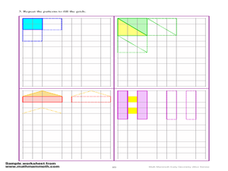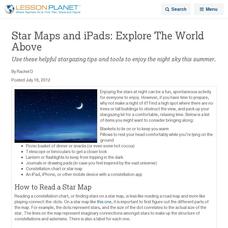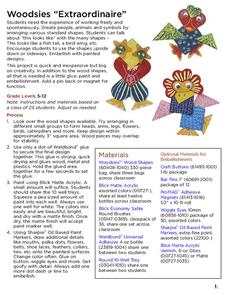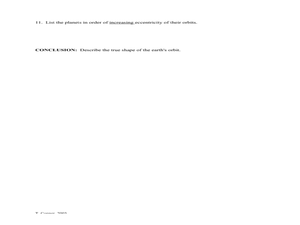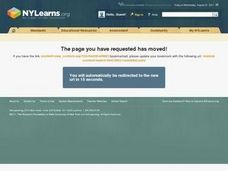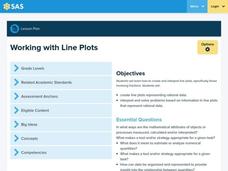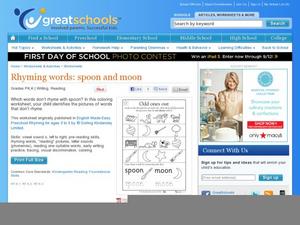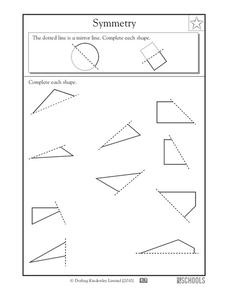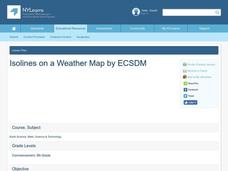Curated OER
Drawing Basic Shapes
Challenge your geometry class with this connect-the-dots activity! Scholars use a ruler to complete simple shapes through connecting dots in 6 shape-identification problems, and identify it from 4 choices: triangle, square, rectangle, or...
Math Moves U
Collecting and Working with Data
Add to your collection of math resources with this extensive series of data analysis worksheets. Whether your teaching how to use frequency tables and tally charts to collect and organize data, or introducing young...
Illustrative Mathematics
Puzzle Times
Give your mathematicians this set of data and have them create a dot plot, then find mean and median. They are asked to question the values of the mean and median and decide why they are not equal. Have learners write their answers or...
Fun Music Company
Compound Time
To demonstrate their understanding of simple and compound time signatures, young musicians complete a chart by drawing quarter or dotted quarter notes equal in value to the note groups shown.
Curated OER
Woven Felt Wall Hanging
Artists of many ages use steel, plastic, tree branches and other natural materials to weave a wall hanging. The materials needed for this fine plan are easy to procure, and the process is clearly-described. The results are beautiful, and...
Curated OER
Star Maps and iPads: Explore The World Above
Use these helpful stargazing tips and tools to enjoy the night sky this summer.
Curated OER
Creating Letter-shape Patterns
Help your budding writers become familiar with letter shapes using a pattern worksheet. They examine three patterns, tracing a dotted line to continue them to the end of the page. For each, they also draw the pattern freehand below. This...
Curated OER
Woodsies "Extraordinaire"
Allow your class to use their imaginations and create fun creatures with various wooden shapes and other embellishments. What a great way to encourage your young artists to stretch their minds!
Owl Teacher
Imaginary Nation: Constructing a Map
Your young geographers will combine what they have learned about the five themes of geography and their inner creativity to design a physical map for an imaginary nation.
Curated OER
Ellipse Lab
Leading the learners to draw a representation of ellipses of planets, this handout will help understanding the planet movement around the sun. There are ten questions about the analysis of those orbits and a conclusino specifically...
Curated OER
Review Graphing Parabolas & Circles
Students review how to graph parabolas. They practice graphing two different parabolas using the vertex and table method. They solve problems related to graphing circles, determining the radius and the center.
Curated OER
Atomic Structure
The first nine slides visit the history of our understanding of atoms. The next several outline the structure of atoms. Subatomic particles, electron configuration, and diagramming methods are introduced. This is a neatly organized...
Curated OER
Counting Dice
Using dice is a great way to practice addition in this simple worksheet. Young learners examine three rolls of two dice each. They add the values of each die, writing an addition problem with an answer. There is an example for them to...
EngageNY
Expected Value of a Discrete Random Variable
Discover how to calculate the expected value of a random variable. In the seventh installment of a 21-part module, young mathematicians develop the formula for expected value. They connect this concept the dot product of vectors.
Curated OER
Measuring Volume/Capacity Using the Metric System
There is more than one way to measure an amount, as learners discover by applying multiple measurement tools in these activities. Centimeter cubes, cylinders, beakers, and measuring cups are used to find the volume of regular and...
Curated OER
Rhyming Words: Spoon and Moon
One of these things is not like the other, one of these things does not belong. It's true! Little learners will say each of the four words in each of four rows, to determine which one does not rhyme with the others. After that, they...
Curated OER
Volume, Mass, and Weight
Study the difference between mass and weight. Your math group will compare the weight of an item to the amount of space that it uses. They'll then use conversion factors to find the difference between kilograms and pounds. Essential...
Mathematics Vision Project
Module 9: Modeling Data
How many different ways can you model data? Scholars learn several in the final module in a series of nine. Learners model data with dot plots, box plots, histograms, and scatter plots. They also analyze the data based on the data...
Curated OER
Symmetry
Enhance your geometry lesson by working with shapes. Fourth graders follow lines of symmetry to complete ten shapes, most of them currently triangles. Have pupils color each half of their shapes to reinforce the idea of symmetry!
Curated OER
Isolines on a Weather Map
Ninth graders recognize isolines on a weather map and draw isolines based on temperature data on a weather map. They draw isotherms on a weather map to identify temperature patterns.
Curated OER
Scissor Skills
In this scissor skills worksheet, students practice cutting from one point to another. Students will be cutting along a variety of line shapes for dexterity practice. Next, students cut our fish and glue onto the tank that has the same...
Curated OER
Valentine Sorting Activity
Get that thinking cap on and engage your special ed or autistic learners in a fun sorting activity. This resource includes instructions and all printable materials needed to start sorting. They will sort colors blue and red, numbers 1,...
Curated OER
Match the Rhymes
Focus on the short u sound in this rhyme worksheet for emergent readers. Learners examine images surrounding a jug, drawing lines to connect it to those that rhyme (bug, rug, mug). Then, they practice their printing by tracing the...
Curated OER
Conversation & Grammar: Future Tenses
This eBook, part of a series devoted to instruction for grammar and conversation, focuses on the future tenses—the future simple, future continuous, future perfect, and future perfect continuous in positive, negative, and question forms.
